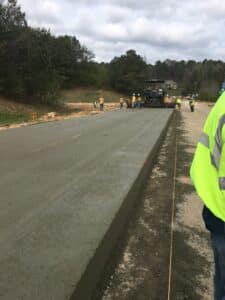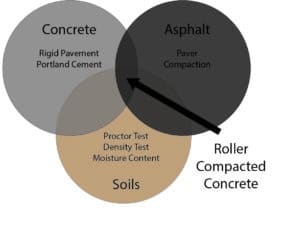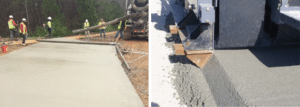 In McCalla, a small community southwest of Bessemer, Alabama, lies an interesting pilot project. Exit 104 on Interstate 59/20, between Birmingham and Tuscaloosa, is your typical diamond interchange, which happens to be home to a large distribution warehouse, a rail to intermodal truck facility, and a Flying J Truck Stop. As with any high truck volume area, McAshan Drive was showing signs of distress, with deteriorated asphalt pavement on both sides of the concrete bridge overpass.
In McCalla, a small community southwest of Bessemer, Alabama, lies an interesting pilot project. Exit 104 on Interstate 59/20, between Birmingham and Tuscaloosa, is your typical diamond interchange, which happens to be home to a large distribution warehouse, a rail to intermodal truck facility, and a Flying J Truck Stop. As with any high truck volume area, McAshan Drive was showing signs of distress, with deteriorated asphalt pavement on both sides of the concrete bridge overpass.
As most counties across Alabama face transportation funding challenges, finding a feasible solution was important for all the entities involved, including the Alabama Department of Transportation, the City of Bessemer, Jefferson County, and the Federal Highway Administration. It was equally essential to construct the project while maintaining traffic flow and not impeding traffic from reaching the Flying J and industrial facilities. One of the project requirements was that access be maintained on both driveways leading into the truck stop. This, along with the knowledge of its use in industrial projects across the state, made roller compacted concrete (RCC) a contender in the repair of McAshan Drive. Volkert oversaw the construction engineering and inspection services of the project.
What is RCC?
RCC is a no-slump concrete, compacted by high-density pavers and vibratory rollers, with no reinforcing steel, forms, or finishers. Although highly used in other states for roadway construction, RCC has been used in Alabama for industrial purposes only. Unlike asphalt, RCC does not rut, shove, or produce potholes. It provides a lifespan of 20 years or more, compared to asphalt’s 10-15 years, is resistant to hydraulic fluid and fluid spills, and will not soften under high temperatures. Also, limited maintenance costs during its lifespan and reduced construction times make RCC the newest tool in Alabama’s transportation toolbox.
 When should the choice be RCC?
When should the choice be RCC?
RCC is most effective when used on projects that are 5,000 cubic yards or more, have straight pulls, and need a higher loading capacity because of heavy transport trucks. RCC was chosen as the avenue of repair for McAshan Drive, making use of longtime experts and local contractor A.G. Peltz. Peltz placed one 10-foot lift of RCC on each end of the existing concrete bridge.
Due to the lack of turning ability of the RCC paver, the ramps were constructed of Portland cement concrete. After placement of the RCC pavement, with initial compaction performed by the paver itself and reaching 94 percent, the final compaction was obtained by a dual drum roller. A curing compound was applied and construction joints sawn as early as possible to reduce the chances of random cracking.
“This location at McAshan Drive was in desperate need of repair, and the choice to place Roller Compacted Concrete was a good one because of its durability and the short time frame given for repairs,” said Brian McCollum, Assistant Project Manager, County Transportation, East Central Region/Birmingham Area. “With as many trucks that come through this area each day, I don’t think there was a better choice for repairs.”
What are the benefits of RCC?
Oher departments of transportation have found multiple benefits of utilizing RCC:
- Improves the structural capacity of existing roadways
- Stimulates competition and lowers the cost to the taxpayer
- Reduces construction time
- Is more durable and resistant to potholes and rutting
- Requires minimal maintenance
- Has a longer pavement life
- Will not soften under high temperatures
- Is resistant to hydraulic fluid and fuel spills
“Two main benefits of roller compacted concrete are its ability to place 10 inches of concrete in a single pass, as well as its minimal long-term maintenance expectations,” said Chris Carwie, business development manager for the contractor. “This accelerates the initial construction process and keeps road downtime to a minimum.”
“With McAshan being a key access point for both the Norfolk Southern’s McCalla Intermodal Transfer Facility and Jefferson County’s 795-acre Metropolitan Park, the use of RCC in this application will increase the structural value of the roadway and hopefully spur additional industrial and commercial development. McAshan Drive offers a prime example of how utilizing roller compacted concrete can provide owners and engineers with a viable solution for urban reconstruction projects.”
 For more information on roller compacted concrete or construction engineering and inspection for transportation projects, contact Cornelia (Sanders) Sides at cornelia.sanders@volkert.com.
For more information on roller compacted concrete or construction engineering and inspection for transportation projects, contact Cornelia (Sanders) Sides at cornelia.sanders@volkert.com.


